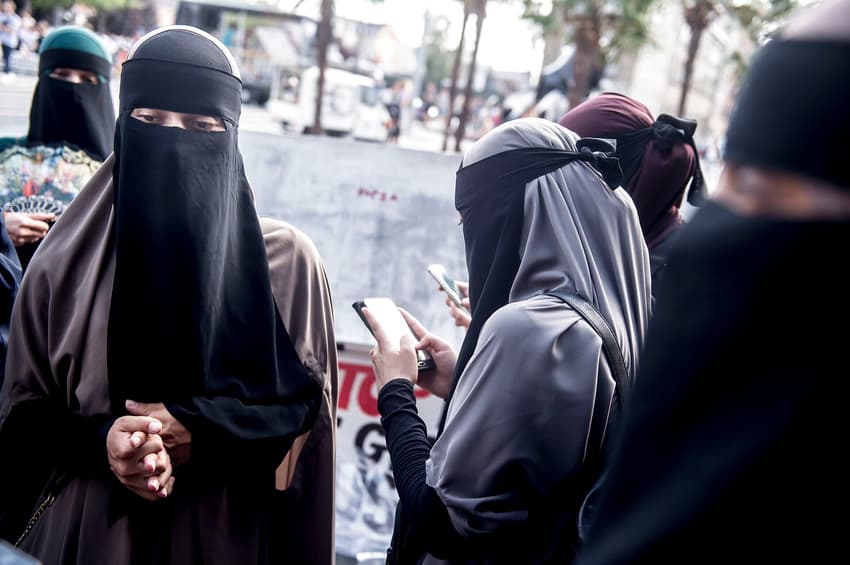Denmark charged one person in 2022 under ‘burqa ban’ law

Last year saw just a single police charge for violation of a 2018 law banning face covering garments, commonly known as the “burqa ban”.
Data drawn by the National Police (Rigspolitiet) from local police departments shows only one charge was issued throughout 2022 for violation of the ban on garments which cover the face.
The ban, which first took effect in 2018, imposes a fine of 1,000 kroner for first offences on individuals wearing garments which cover the face, notably types of veil worn by some Muslim women. These include the burqa, which covers a person's entire face, or the niqab, which only shows the eyes.
Other accessories that hide the face, such as balaclavas, are also covered by the ban.
The passing and implementing of the law in 2018 took place around considerable public debate and criticism.
READ ALSO: 'From one day to another, we're criminals': Muslim women speak against Denmark's burqa ban (2018)
The initial years after the ban was introduced saw a higher number of charges.
In the first 12 months after it was put in place, some 23 people were fined under the law.
More than 20 people were charged in 2018, 2019 and 2020, but the number has since dwindled with just two charges made in 2021 and a single charge last year.
Senior coalition partner the Social Democrats – who were not in government when the law was passed but voted in favour of it – say the law is still justified despite a near absence of charges.
“We now have a ban on face coverings in public and our stance is that we will retain this,” the party’s spokesperson for immigration and integration, Kasper Sand Kjær, told news wire Ritzau.
Some opposition parties have called for the law to be scrapped, including the left-wing Red Green Alliance (Enhedslisten) and centre-left Social Liberals (Radikale Venstre).
Kjær told Ritzau that the low frequency of cases in which the law was enforced “might show that the law works and that people aren’t covering their faces in public.”
“That’s the intention of it,” he said.
“The intention was not necessarily to pursue a lot of cases but to send a very clear signal and establish a shared rule in public that when we are out amongst each other, we should be able to see and interact with each other,” he said.
Comments
See Also
Data drawn by the National Police (Rigspolitiet) from local police departments shows only one charge was issued throughout 2022 for violation of the ban on garments which cover the face.
The ban, which first took effect in 2018, imposes a fine of 1,000 kroner for first offences on individuals wearing garments which cover the face, notably types of veil worn by some Muslim women. These include the burqa, which covers a person's entire face, or the niqab, which only shows the eyes.
Other accessories that hide the face, such as balaclavas, are also covered by the ban.
The passing and implementing of the law in 2018 took place around considerable public debate and criticism.
READ ALSO: 'From one day to another, we're criminals': Muslim women speak against Denmark's burqa ban (2018)
The initial years after the ban was introduced saw a higher number of charges.
In the first 12 months after it was put in place, some 23 people were fined under the law.
More than 20 people were charged in 2018, 2019 and 2020, but the number has since dwindled with just two charges made in 2021 and a single charge last year.
Senior coalition partner the Social Democrats – who were not in government when the law was passed but voted in favour of it – say the law is still justified despite a near absence of charges.
“We now have a ban on face coverings in public and our stance is that we will retain this,” the party’s spokesperson for immigration and integration, Kasper Sand Kjær, told news wire Ritzau.
Some opposition parties have called for the law to be scrapped, including the left-wing Red Green Alliance (Enhedslisten) and centre-left Social Liberals (Radikale Venstre).
Kjær told Ritzau that the low frequency of cases in which the law was enforced “might show that the law works and that people aren’t covering their faces in public.”
“That’s the intention of it,” he said.
“The intention was not necessarily to pursue a lot of cases but to send a very clear signal and establish a shared rule in public that when we are out amongst each other, we should be able to see and interact with each other,” he said.
Join the conversation in our comments section below. Share your own views and experience and if you have a question or suggestion for our journalists then email us at [email protected].
Please keep comments civil, constructive and on topic – and make sure to read our terms of use before getting involved.
Please log in here to leave a comment.